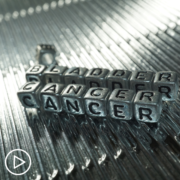How Does Targeted Therapy Treat Bladder Cancer?
How Does Targeted Therapy Treat Bladder Cancer? from Patient Empowerment Network on Vimeo.
Dr. Fern Anari, a bladder cancer specialist from Fox Chase Cancer Center, explains how targeted therapy works and which type of patient this therapy is most appropriate for.
Dr. Fern M. Anari is a genitourinary medical oncologist and assistant professor in the Department of Hematology/Oncology at Fox Chase Cancer Center. Learn more about Dr. Anari, here.
See More From The Pro-Active Bladder Cancer Patient Toolkit
Related Programs:

|

|

|
Transcript:
Katherine Banwell:
What is targeted therapy, and how does it work to treat bladder cancer?
Dr. Anari:
So, targeted therapy is really a newer, more tailored approach to treating certain types of bladder cancer. Targeted treatments because they’re targeted have most of their effect on the cancer cells. Although, obviously, there’s other potential side effects. But the way it works to treat bladder cancer really depends on the different types. There are several different targeted treatments out there.
Often, targeted treatments are approved for people after they’ve gotten chemotherapy and/or immunotherapy for their bladder cancer treatments. There are several different ones out there. Erdafitinib is one of them. It’s a pill. It’s approved for patients who have an FGFR alteration.
Well, what is that? It’s something that your doctor finds by getting the DNA or genetic makeup of your cancer cells. So, those pills are available to people with that certain alteration that’s found on special testing.
With these pills, potential side effects – we talked about how the effects are mostly on the cancer cells. But there are other side effects that we have to keep in mind. This drug in particular can have different eye disorders. So, we work closely with ophthalmologists.
And then we check blood work because people can have high phosphate levels in the blood. Phosphate levels can be controlled often with diet, sometimes with medications, and sometimes with just adjusting the dose of the pill itself.
Katherine Banwell:
You mentioned the FGFR genetic alteration. Should bladder cancer patients undergo molecular testing?
Dr. Anari:
So, the most common place where we do that is when people have metastatic bladder cancer. It’s a good idea to test the biopsy sample or bladder cancer sample that’s already been removed.
That way we get this information. While it doesn’t always change the up-front treatment for bladder cancer, it is really important to know really what tools in our toolbox we have for the treatment of bladder cancer.









